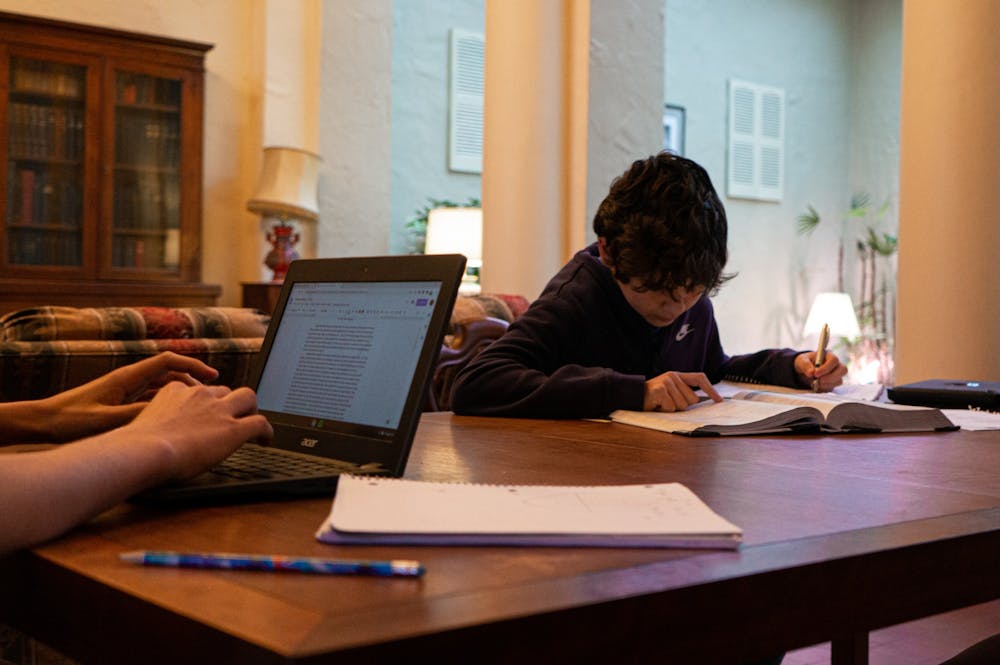All OCS students in grades 4-12 are eligible to receive Chromebooks. However, even with this technology, Board of County Commissioners Chairperson Penny Rich said access to reliable Wi-Fi is a large problem for families who live in rural areas of the county.
“We don’t have the ability to provide reliable broadband out in the county because large cell companies do not want to work with rural populations,” she said. “We do have a grant with open broadband to try and get folks hooked up to their services. It’s happening, but happening way slower than we thought.”
Spectrum is offering free broadband and Wi-Fi to households with K-12 or college students for the next 60 days, according to the OCS website. The district also lists several public Wi-Fi sites at county community centers, but since the centers are closed, students will have to access the service from parking areas.
Carr said some teachers are concerned because unlike CHCCS, teachers in OCS have been told by the district that they cannot provide, test or grade students on new material. Instead, they can only provide enrichment, which she said has a particular impact on students in honors, IB and AP courses.
But Carr said she believes the district will change this policy now that students are out of school for a longer period of time.
“We can’t hold off on presenting new material until May 15,” she said. “That can’t happen.”
The state's response
Cooper’s decision to extend school closures has raised questions of how districts are expected to handle an extended period without in-person classes.
A state law requires all schools to complete a minimum of 185 days or 1,025 hours of instruction, and some have raised concerns that schools won't be able to meet this requirement due to school closures.
Carr said teachers worry that if the school year is extended to meet this learning requirement, they will have to give up summer jobs many of them use to supplement their incomes.
"One of the other concerns we all have is we are doing all of this distanced learning and all of this remote instruction, which is right now for me taking 9 to 10 hours of my day every day. We don't want to end up with these hours tacked on at the end of the school year when we've already done these hours," Carr said.
N.C. Representative Graig Meyer (D-Caswell, Orange), who is serving in the education working group for the N.C. House Select Committee on COVID-19, said he thinks the General Assembly will have to alter the calendar law for this school year. The General Assembly has previously created flexibility in instructional hour requirements due to Hurricane Florence school closings.
To get the day's news and headlines in your inbox each morning, sign up for our email newsletters.
At a virtual education town hall on Tuesday, Meyer said it is quite possible the General Assembly will have a special session in order to address coronavirus concerns across the state before they are set to reconvene on April 28.
Until then, the state is working on other virtual resources to assist with remote learning.
Cooper has directed the N.C. Department of Public Instruction to work with the N.C. State Board of Education to draft policy guidance for local school districts.
The NCDPI has compiled a website for remote learning resources for parents, students and teachers, and Meyer said the NCSBE has collaborated with UNC-TV to help provide educational material so children who don’t have Internet at home can learn through public television.
Meredith Gaskill, a student adviser on the NCSBE and a senior at Carson High School in Rowan County, said the board is also talking about how teacher effectiveness will be measured, given the lack of normal standardized testing schedules.
Gaskill said she has been attending online classes via Zoom meetings and Canvas conferences. In school districts with more limited access to technology, she said, some schools are operating drive-thrus, where students can pick up packets at the beginning of the week and return them to teachers and administrators at the end of the week.
Nate Kolk-Tomberlin, a student adviser on the NCSBE and a junior at Apex High School, said he thinks the board also needs to consider that students studying courses that build on previous material, like math, might need additional support ahead of next year’s classes.
“We’re going to continue to figure out the best ways we can educate our students,” Kolk-Tomberlin said. “And those students who don’t have access to technology devices, we need to figure out ways that we can educate those students and that they can receive the same level of education as their counterparts who do have access to technology.”
As of now, North Carolina schools will be closed until May 15, and students may be able to return to in-person classes before the end of the school year.
@sonjarao | @nihavattikonda
@DTHCityState | city@dailytarheel.com



